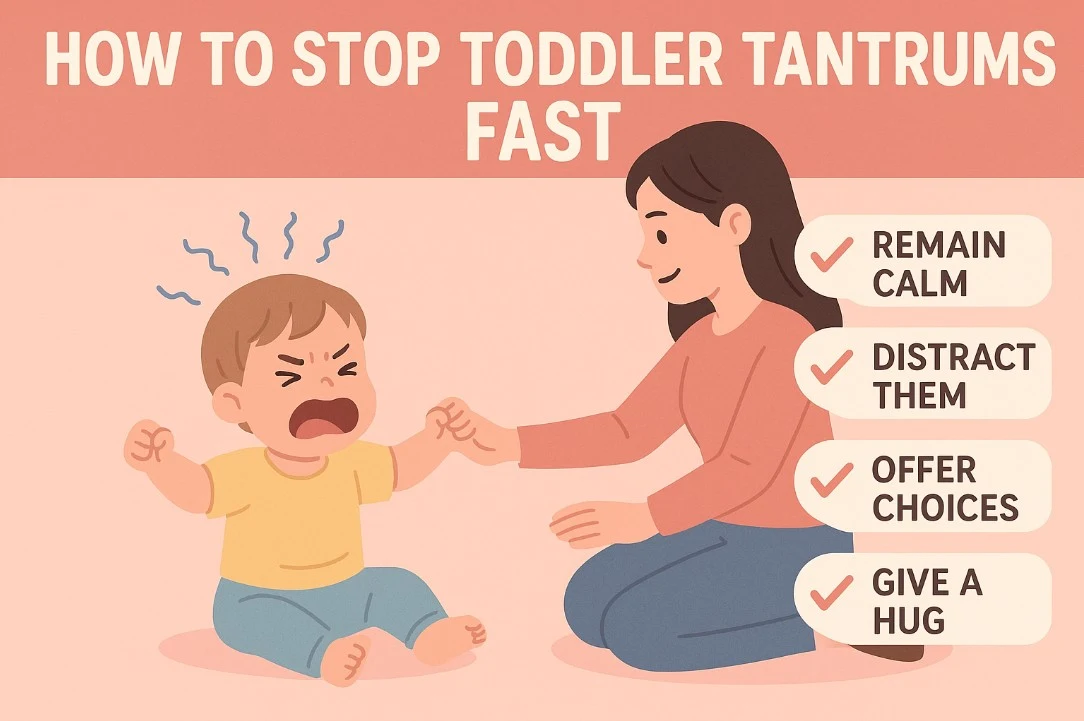Parenting a toddler can be both rewarding and challenging, especially when tantrums strike. If you’ve ever wondered how to stop toddler tantrums fast, you’re not alone. Tantrums are a normal part of child development, but they can be overwhelming for parents. The good news is that with the right strategies, you can minimize meltdowns and restore peace quickly.
we’ll explore five proven tips to help you how to stop toddler tantrums fast effectively while maintaining a calm and supportive environment.
Why Do Toddlers Have Tantrums?
Before diving into solutions, it’s important to understand why tantrums happen. Toddlers (ages 1-3) are still developing emotional regulation and communication skills. Common triggers include:
-
Frustration – Unable to express their needs.
-
Hunger or tiredness – Physical discomfort leads to irritability.
-
Seeking attention – Wanting a parent’s focus.
-
Overstimulation – Too much noise, activity, or change.
-
Testing boundaries – Learning what they can and can’t do.
Knowing these triggers helps in preventing and managing outbursts. Now, let’s explore how to stop toddler tantrums fast with practical strategies.
5 Proven Tips to Stop Toddler Tantrums Fast
1. Stay Calm and Composed
Toddlers mirror emotions—if you react with frustration, the tantrum may escalate. Instead:
-
Take deep breaths to remain patient.
-
Use a soft, reassuring tone to show control.
-
Avoid yelling or punishing in the heat of the moment.
A calm response helps your child feel secure and may shorten the tantrum.
2. Distract and Redirect Their Attention
Toddlers have short attention spans. Shifting their focus can stop a tantrum before it worsens.
-
Offer a toy or activity they enjoy.
-
Point out something interesting (“Look at that bird outside!”).
-
Change the environment (move to another room).
Redirection works best when done early before frustration peaks.
3. Validate Their Feelings
Even if the reason seems trivial, acknowledging emotions helps toddlers feel understood.
-
Say, “I see you’re upset because you want the toy.”
-
Avoid dismissing their feelings (“It’s not a big deal”).
-
Offer comfort with a hug if they’re receptive.
Validation reduces power struggles and builds emotional intelligence.
Know More: Old Man Yells at Cloud
4. Set Clear and Consistent Boundaries
Tantrums often happen when toddlers test limits. Consistency helps them learn expectations.
-
Use simple rules (“We don’t hit; use gentle hands.”).
-
Follow through with consequences if needed (brief time-outs).
-
Praise good behavior to encourage positive actions.
Clear boundaries reduce confusion and prevent future meltdowns.
5. Prevent Tantrums Before They Start
Proactive strategies can minimize tantrum triggers:
-
Maintain routines for meals, naps, and playtime.
-
Offer choices (“Do you want the red or blue cup?”) to give them control.
-
Watch for warning signs (crankiness, whining) and address needs early.
Prevention is key in how to stop toddler tantrums fast and effectively.
When to Seek Professional Help
Most tantrums are normal, but consult a pediatrician if:
-
Tantrums last longer than 15 minutes or occur multiple times daily.
-
Your child harms themselves or others during outbursts.
-
They struggle with speech or social interactions.
Professional guidance can rule out underlying issues like autism or ADHD.
Final Thoughts
Learning how to stop toddler tantrums fast takes patience and practice. By staying calm, redirecting attention, validating feelings, setting boundaries, and preventing triggers, you can reduce meltdowns and foster a happier home.
Every child is different, so experiment with these tips to find what works best for your toddler. With consistency and empathy, you’ll navigate tantrums more smoothly and strengthen your bond with your little one.
FAQs About Stopping Toddler Tantrums
1. How long do toddler tantrums usually last?
Most tantrums last 2-5 minutes, but extreme cases can go longer. Staying calm and using distraction helps shorten them.
2. Should I ignore my toddler’s tantrums?
Ignoring attention-seeking tantrums can work, but never ignore distress from hunger, pain, or fear. Comfort them if they’re overwhelmed.
3. Will giving in to tantrums spoil my child?
Consistently giving in teaches them that tantrums work. Instead, offer alternatives and praise calm behavior to reinforce positive habits.
Know More: decadgarden
